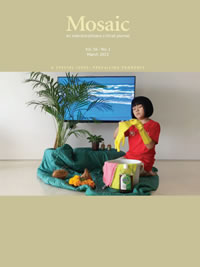Issue 56.1
Overview

Special Issue: Prevailing Pandemic
Published: March 2023
View the issue introduction or see the issue summary and contents below.
12 essays, totalling 212 pages
$24.95 CAD
Guest edited by Xiaohui Liang and Claire Chambers, this special issue explores pandemic literature in contemporary English and Chinese fiction.
Prevailing Pandemic: Vulnerability and Solidarity in Contemporary English and Chinese FictionClaire Chambers and Xiaohui Liang N/A. | |
Vulnerable Subjects: Ling Ma’s Severance and Karen Thompson Walker’s The DreamersJanet Wilson This essay brings into dialogue two pre-Covid speculative fictions—Ling Ma’s Severance (2019), and Karen Thompson Walker’s The Dreamers (2018)—and identifies empowering resilient-resistant responses to viral contagion centred on a “reproductive futurism.” Yet their narratives of survival reinscribe cultural differences and patriarchal structures: revised social imaginaries reveal ambivalent outcomes. | |
Forms of Covid: Fiction After March 2020Pallavi Rastogi This essay examines different forms of Covid fiction through Kamila Shamsie’s “The Walk” (2020), Jhumpa Lahiri’s “Letter to Italy” (2020), and Mohsin Hamid’s The Last White Man (2022) and traces the turn from direct depictions of the pandemic to oblique representations of Covid that also include the intersectionality of crisis. | |
Pandemic Writing as an Ecological ForceXiaohui Liang and Claire Chambers Covid-19 fiction tends to exhibit the potential of literary discourse as an ecological force. Illuminated by cultural ecology, the essay puts Fang Fang’s Wuhan Diary into conversation with Aristide’s Under the Blue, Bi’s Coronavirus, and Smith’s Intimations, deploying texts from both Chinese and English contexts for a comparative global perspective. | |
Ecoprecarious (Inter)dependencies in Dystopian Narratives of PandemicsCristina M. Gámez-Fernandez This essay analyzes the narratological use of pandemics in John T. Prather’s The Nephilim Virus and Katie M. Flynn’s The Companions from the perspective of ecoprecarity, the Fourth Industrial Revolution, disability studies, and critical posthumanism to contend that these dystopian novels represent two divergent ideological positions towards (non)human vulnerability. | |
Plague as the Prism to the Structure of FeelingsMin Zhou and Yunchan Lan With an imaginative account of the Manchurian plague that broke out a century ago, Snow and Raven delineates the phenomenology of “life” that ordinary people demonstrated in the face of calamity, showcasing how the pandemic acts as a prism to the structure of feelings in a plague-stricken society. | |
In Search of Reality: Disease and the Overshadowed Countryside in Yan Lianke’s Dream of Ding VillageHaiyan Xie and Weihua He With its examination of the corruptive effects of a money-oriented rural community and the “diseased” human nature encapsulated in the AIDS epidemic, Yan Lianke’s Dream of Ding Village laments the inevitable decline of the countryside in the face of the encroaching force of modernity in the process of China’s social transformation. | |
The Political Unconscious of P.D. James’s The Children of MenAleks Wansbrough P.D. James’s novel The Children of Men depicts how constructions of British identity hinder solidarity. Using Jameson’s notion of the political unconscious, the essay contends that the text remains relevant to our quasi- or post-Covid times in its presentation of solidarity despite the book’s problematic qualities. | |
Gendered Narratives on Epidemics: HerStories as Textual EnvisioningLingling Yao This essay analyzes three disease-themed novels by Chinese women writers post-2020, asserting that gender- and eco-aware feminist narratives can shape a more equitable, forward-looking human future. It also critiques sexist interpretations of idealized female characters and the overemphasis on female rivalry in these narratives. | |
Anglophone Narratives of World War II in China and Historical Lessons for Building International SolidarityZou Li and Christopher Rosenmeier Lessons from past crises, such as the widespread sense of global solidarity during the Second World War, offer insights for today’s pandemic responses. Blending epidemiology and psychoanalytical theory with literary criticism, this essay explores how Chinese anglophone narratives of the Second World War might inform current efforts. | |
‘Melancholia,’ Youyuzheng, and Yu: Mental Illness as a Call for National Salvation in Yu Dafu’s SinkingJianxin Dong and Ming Dong Gu This essay examines “melancholia” (youyuzheng) as a notion introduced into Chinese society by the Chinese writer Yu Dafu in his novella Sinking. By describing its symptoms in the novella, the author expresses a concern over national degeneracy and ironically transforms a mental illness into a literary call for national salvation. | |
Afterword: Vulnerability, Solidarity, and Posthuman Reflections in the Pandemic EraNing Wang N/A. |